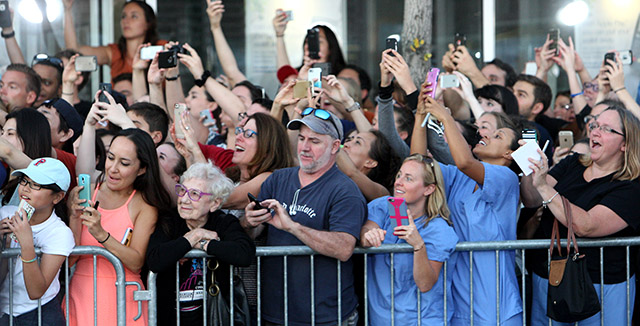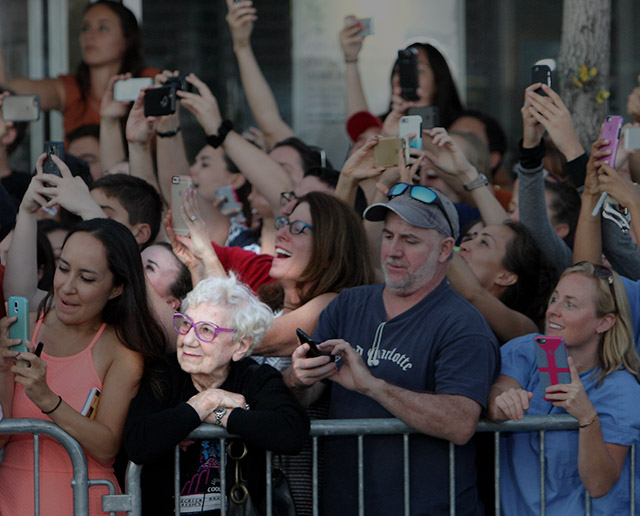It’s a bit shocking to realize sometimes how absent we are in situations or places where we ourselves choose to be. It’s like we are almost ghosts – part of us is there, part of us floating in who knows what cloud.
Remember the last time you went on holidays or visited a nice new place? Remember what was the first thing you did right after arriving and seeing that new place? If you didn’t grab your camera immediately, well then, congratulations. Most people nowadays seem to spot something they like, and instead of observing and admiring it, they take a photo, and not just that, they are more focused on how the photo looks, and how it will look on social media after selecting all these nice filters on Instagram, that they forget to look around! Well, on the bright side, they will at least have a record of the holidays they never had because they were busy… taking photos.
There was a shot that went viral last September that represents exactly this situation. Look at the first photo and see if you spot it:

There is only one person in that audience actually seeing and observing what’s going on. Only one:

This is exactly what “mindlessness” is about – your body is there (you know that, because there is a selfie of you that proves it), but your attention is absolutely absent, and so seems to be your spirit.
What we fail to see is how much more fulfilling our experiences would be if we were fully present and conscious of them.The point is not whether we should take photos or not, the point is to pause and appreciate what we are seeing and feeling. The maxim of mindfulness would be something like: “if you are eating, eat; if you are walking; walk; if you are playing with your children, then play with your children.” But how can we do it with so many (digital) distractions around us? It takes time and perseverance, but it’s worth it because the benefits are numerous.
As we focus on what we are doing and do not allow ourselves to be distracted, we become more aware of our feelings and emotions. We can therefore say that mindfulness increases our emotional intelligence, which will in turn improve our ability to manage conflict and communication.
Mindfulness should be applied in every aspect of our lives, work included, by just focusing on one task at a time. At work, it will definitely make us more efficient; in life, it will undoubtedly make us feel happier and more fulfilled.
We were discussing a few days ago that some of us have trouble remembering important details of conversations we’ve had with friends; even though we do care about what they are saying, we still forget parts of our chat. Some of us also said that have little recollection of our commute, and sometimes we notice changes in the environment only after a few days of passing right by them. It is incredible how much and how often we lead our lives on autopilot, in our own “zone”.
A few months ago I was taking Catalan lessons. In one exercise we were asked to relate out loud how much we enjoy doing housework. One of my classmates, a very nice Russian girl, said that she loved it, specially washing up. She went on explaining that her family is quite big and noisy, and that washing up is her time to concentrate on just that. “It’s my time to be alone”, she said, “I just love doing it slowly, feeling the warm water over my hands, listening to that subtle sound of the water, feeling the foam…”. It was a bit weird at that time to me that someone could wash up with such enjoyment, but now I get it – she was being mindful, she was totally abstracted from the outside world and was paying attention to her feelings. It was a sort of meditation for her.
We find happiness and joy when we are fully engaged in the present, in what we are doing now. Share on X
So we find happiness and joy when we are fully engaged in the present, in what we are doing now. Research sustains it, and people who manage to do it (and mind you, it’s not a big science, it’s just a matter of commitment and perseverance) claim that they’ve never felt better, that they have seen their stress and anxiety levels decrease, and that the quality of their lives has improved. The author of this beautiful and inspiring video would surely agree:
We invite you to engage in a challenge. Let’s start by a simple task – tonight, when we are cooking dinner, let’s not think about work, responsibilities or things to do. Let’s just cook, have a glass of wine, and have an easy talk with whoever shares the place with us, leaving smartphones somewhere out of sight and unheard. Then when we eat (regardless of our cooking skills and how tasty our food turned out to be), let’s take our time, let’s not rush, and let’s savour it.
Then tomorrow, whatever our job, let’s try to do one thing at a time.
Make it a 7 day challenge. During 7 days in a row, we need to have at least one mindful moment in the day. It won’t be easy, so it would be great if we could all share our experience and progress and see how far we get. You can use the comment box below this article or, if you are a Twitter user, use #MindfulnessChallenge and tag us with @analyze_life so we can see it.
Sometimes we need a little push to improve the way we live. Let’s encourage each other to follow and meet the challenge, and let’s see how we feel afterwards!